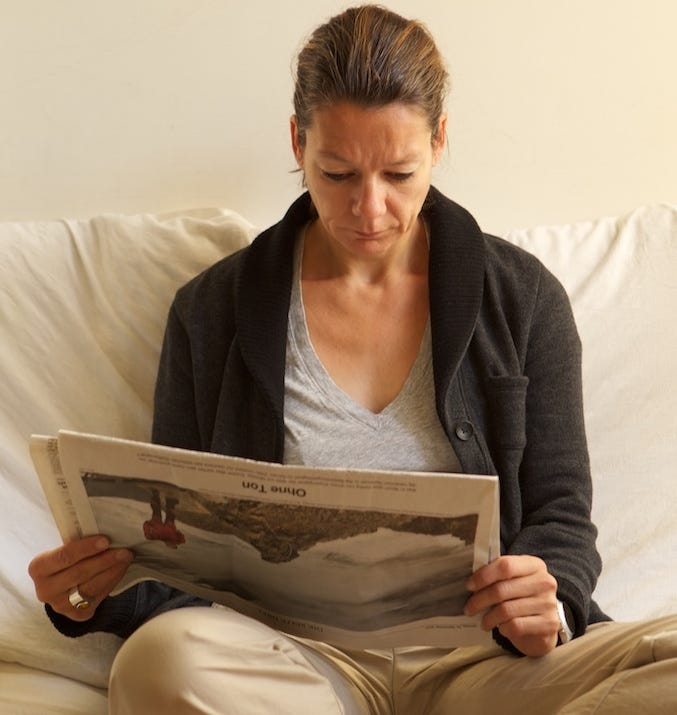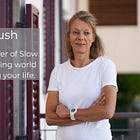Why I Got Annoyed With This Newspaper Headline On Self-Confidence
And what you can take away from it regarding self-awareness, introversion and confidence
Hello out there - in a rushed world,
Here comes your weekly permission to Un-rush and Stress Less.
Timeless insights and impulses on how the power of slow helps you grow - in a rushing world crushing your life
If you enjoy reading this post from my Newsletter Un-Rush, feel free to share it with your friends and click the❤️ button, so more people can discover it on Substack. Thank you!
This is a free issue of Un-Rush – but there is a lot more in it for paid subscribers. For less than $1 a week, you get members ’-only articles, book reviews and recommendations, invites to exclusive in-person events, and of course, the good feeling of knowing that you are making longer, deeper, and more thorough research and writing possible for me.
IMPULSE
Why I Got Annoyed With This Newspaper Headline On Self-Confidence
And what you can take away from it regarding self-awareness, introversion, and confidence
The other day I was reading this headline in a weekly German newspaper, and it made me cringe a bit. It said, translated into English: How can I still become self-confident – There are techniques to learn how to present yourself confidently. Also for introverts.
It triggered a whole avalanche of thoughts in my head because it felt wrong and superficial, and not like the “headline” I expect from this excellent (printed!) weekly newspaper (Die Zeit).
Firstly, self-confidence is rather about understanding yourself than it is a technique to apply to present yourself with confidence.
Secondly, it said, “Also for introverts”. Also. For. Introverts. Really?
In other words, we assume that introverts have normally no self-confidence, but, hey, even if you are an introvert, you can learn how to be self-confident. And this, as they clarify in the article, “without having to become extroverted”. This, conversely, means that we generally assume that self-confidence is directly linked to extroversion and introversion. I think that’s wrong, and it implies that if you are an introvert, you will have a tough time learning and using those tools that are supposed to help you present yourself confidently.
So, let’s take a closer look at the two things that made me wonder and question what people (readers) believe:
1. Do we see self-confidence as something we learn with techniques?
2. And, do we believe there is a connection between introversion/extroversion and self-confidence?
I don’t believe in any of these two. And here is why you shouldn’t either.
Self-Confidence Is Not A Tool But A State Of Being
Self-confidence: Is it talent? Is it down to genes? Or can it be learned?
I suggest self-confidence is about self-discovery. You become aware of yourself, which leads to being more confident in who you are.
This is where it gets a bit messy with the language.
You have one word in German (self-awareness) that is expressed in two words In the English language (self-confidence and self-awareness).
If you put self-confidence into the translator for German, it would be the equivalent of the English word self-awareness (Selbstbewusstsein). Normally, the German language is pretty precise, and you will find four German words expressing different notions of what would be in the English language reduced to just one word. Normally, that’s nice and precise, in this case, the English version is useful. If you look closer, in both languages, it is the awareness of oneself. And to be aware of your SELF is not an easy thing.
Self-confidence is based on self-awareness
"Happiness is not found at the summit, but within us. When we are completely ourselves." — Reinhold Messner, climber, explorer, and the first person to climb all 14 eight-thousanders, doing so without supplementary oxygen.
We feel comfortable and confident with ourselves when we know ourselves, when we are aware of our values, principles, likes, dislikes, goals, and visions.
“There is strong scientific evidence that people who know themselves and how others see them are happier. They make smarter decisions. They have better personal and professional relationships. They raise more mature children. They’re smarter, superior students who choose better careers. They’re more creative, more confident, and better communicators. They’re less aggressive and less likely to lie, cheat, and steal. They’re better performers at work who get more promotions. They’re more effective leaders with more enthusiastic employees. They even lead more profitable companies.” - Tasha Eurich (in “Insight: The Surprising Truth About How Others See Us, How We See Ourselves, and Why the Answers Matter More Than We Think”).
Self-Awareness Is The Key
While a precise definition can be more complex, at its core, self-awareness is the ability to see ourselves clearly, to understand who we are, how others see us, and how we fit into the world.
Being aware of yourself means that you deal with yourself to understand what your values, principles, aspirations, preferences, wishes, dislikes, tastes, or preferred/non-preferred environments are. You make choices based on what your understanding of yourself is, and what aligns with who you are. Self-awareness is like an inner compass or guidance. It also encompasses an understanding of how others see and feel you.
Becoming aware of yourself is a process of self-discovery. This means getting to know yourself beyond the surface and having the courage and willingness to confront fears, self-doubts, and insecurities that have held you mentally imprisoned. It is an act of liberation. And this act of liberation leads on the same toke to self-confidence.
One of the most powerful “tools” we have on the discovery journey is our inner voice. This is connected to your intuition, your trust in yourself, and, also, shutting up that voice when it gets nasty. This process needs attention and time. Which most people don’t want to give. But that's where you get to the essence of your personality. Listen to your voice carefully, it is the compass that guides you toward your self-awareness, self-confidence, and, self-love.
“The ultimate source of a happy life is the attention we place on our inner values.” - The Dalai Lama
Self-Love Matters
“Self-awareness and self-love matter. Who we are is how we lead.” – Brené Brown
Before you start any of the above, your journey of self-discovery, which leads to self-awareness, which builds your self-confidence, you have to love yourself.
We tend to think of self-love as something that comes after self-realization and improvement, you like yourself because you have accomplished this and that. Here is what Brené Brown says: “That's backward. If you want to make the most of your abilities and become the most self-actualized version of yourself you can, then you actually have to love yourself first.”
Introverts And Self-Confidence
Let’s demystify the idea that extroversion and introversion are directly connected to self-confidence.
As seen above, self-confidence has a lot to do with self-discovery and self-awareness, regardless of what kind of person is embarking on that path of getting to know herself. Being a self-aware person is independent of personality type, profession, age, gender, or education.
Conventional wisdom says great leaders, self-confident people, are extroverts. Not necessarily. Quite the opposite. I assume you look at Steve Jobs, Bill Gates, or Barack Obama as pretty self-confident people. Yet, all three of them are famously introverted. Self-confident people can be introverts or extroverts. So, no direct connection.
But, let’s change perspective and look at some traits of self-confident people. They think before they speak, they are good listeners, they are deep thinkers, they are calm in a crisis.
All of which are traits of introverted people.
Introverts are more likely the ones who think things over, consider how their words will affect others, and only then speak out. They think before they speak, which is just about the opposite of what extroverts do. While many introverts are inspirational public speakers, they very much believe in writing things down because it forces the brain to hone and clarify its ideas.
While extroverts tend to jump from subject to subject, Introverts are deeper thinkers and enjoy having alone-thinking-time. They prefer to dive into issues before making decisions and moving on to the next subject. Introverts are good listeners and observers and tend to carefully consider the comments and perspectives of others before making an important decision.
When there is a crisis, you can most likely rely on the introverts being the ones projecting a reassuring, calm confidence. They tend to speak calmly and slowly, regardless of the boiling situation or out-of-control discussions.
Technique Versus Being
When we develop, grow, and make improvements in our self-knowledge, we feel a new level of confidence. Self-awareness is a journey, and so is self-confidence which is based on self-awareness. And you keep working on it and honing it all your life.
Being aware of yourself fuels your confidence. It is not a technique or tool (as described in the article I read) to pull out, use, or put aside, as wished. You can “learn” self-confidence by learning about yourself. It doesn’t matter whether you are an introvert or an extrovert, in fact, you might even have a slight advantage when being an introvert.
The more you embark on the continuous process of looking inward and growing your self-awareness, the more self-confident you become. You take less BS because you know who you are.
“It’s a continual process of looking inward, questioning, and discovering the things that have been there all along.” - Tasha Eurich
Hi there, a brief reminder of where you are:
I’m Claudia, encouraging and inspiring you to shift down a gear on that hamster wheel everybody wants us to push faster and faster. Let’s embrace the power of slow, a healthier way to live and work. My life has taken place on three continents, with work in marketing, and project organization, currently spending my time writing, creating photography events, and growing two communities. When I am surrounded by nature, books, my husband, and friends, I am one happy camper.
You can also find out more about what the publication Un-Rush is all about and who is behind it, here:






